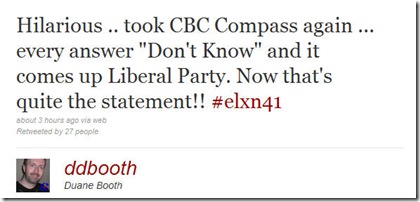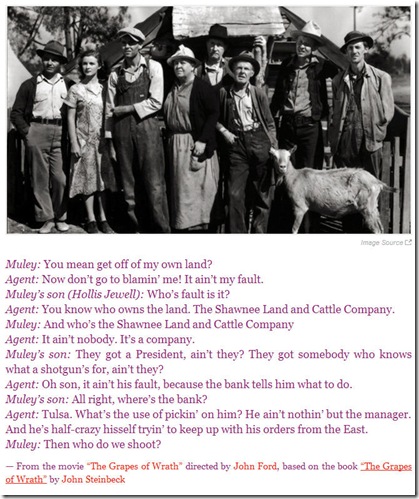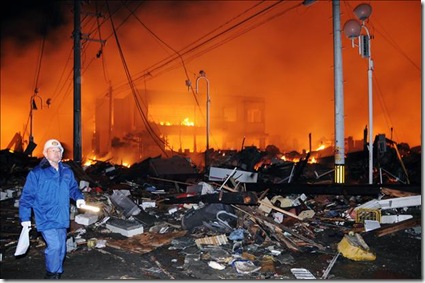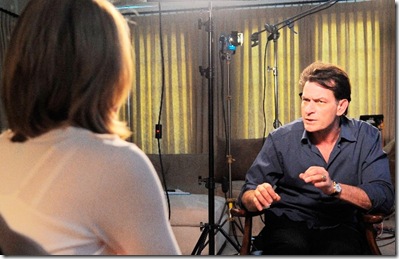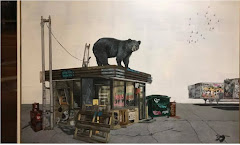
Everybody understands the concept of the "Cover Your Ass" memo.
Although the term only originated in the 1960's and wasn't in the public vernacular until NASA's "Challenger" disaster, government bureaucrats, corporate functionaries and military officers since time immemorial have tucked a little something in the files to make sure they don't take the blame for whatever disaster might befall their endeavors.
In Spanish, the term used is "Tapaculo", the name of a colorful bird which can put its tail between its legs.
The French have a wonderfully picturesque phrase, "Cherchez Les Grecs", which literally translates as "Find some Greek guy to take the fall" -- terminology also offering an interesting perspective on the current European financial crisis.
They actually teach CYA etiquette in business schools these days. The general rule is that if they're written before a policy is enacted, they're proactive, positive and ethical because they can clarify original expectations or document decisions and actions to prevent any later misunderstanding.
When they come after the fact, however, they are negative and unethical created only to justify poor decisions. And those authoring them are not really trying to make the world a better place.
Which brings us to Telefilm Canada…
Over at Canada's primary film financier and determiner of all things Cinematic, covering your ass isn't just a catch phrase, it's been the standard operating procedure of Chair of the Board, Michel Roy and now seems to have been picked up by his new boss, Executive Director Carolle Brabant.
Those who visit the Legion regularly for our always intelligent and cutting edge assessments of the film and TV scene in Canada, will recall Monsieur Roy from his recent attempt to shift the blame for Telefilm's failed feature film policies onto Canadian actors.
We all know that Telefilm's various strategies to lay claim to a mere 5% of the Canadian theatrical box-office have been an unmitigated disaster.
There are a lot of reasons for that, many of which have been discussed ad nauseum around here. Just search "Telefilm and failure" on the blog for more than enough to both fill and spoil your weekend.
But back to M. Roy who, rather than trying out any of the suggestions that have come from all manner of industry stakeholders, announced last December that the 5% Solution just wasn't the ruler we should have been using to measure success.
Well, silly us!
All this time, poor Canadian filmmakers have been made to fumble their box-office dicks out to be compared against the overblown studio dicks imported from America. Well, of course audiences would rather pay to see what those other guys had!
And no wonder we'd develop such a terrible National Inferiority Complex in the process! I mean, who wouldn't!
And we'd be just as misguided if we thought any of our ongoing Box Office failure had anything to do with Telefilm or the kind of movies they green light.
No, no, no -- the films are great! We've just had this measuring why the audience stays away from them thing ALL WRONG!
Box office receipts aren't how you determine if a film's been successful! It's…
Well, M. Roy didn't exactly detail what the proper measurement criteria was. Because -- gee -- there are just so many we could choose!
There's foreign sales, TV, DVDs, digital platforms. Hey, how about success at festivals? A lot of our movies go to festivals. True, most of them never get picked up for distribution or even seen anywhere after that, but still…
And if that's not enough "better than Box-office" rulers for you, there's always -- um -- well, the man suggests…critical acclaim.
Really?
How about those little cards people fill in after screenings?
Letters from the director's mom…?
Sigh.

This, my friends, is Ass Covering of the highest order. Far be it that anyone connect a Telefilm Lifer like Michel Roy to a policy that has been a failure since it was first conceived in 2000, was still a failure when people reviewed it in 2005 and remains a failure six years later.
Eleven years and this bright light and his bureaucratic associates haven't been able to find one single way to meet their own modest goal.
How many of us would still have our jobs after a decade of not performing as expected?
Make that -- not performing and assessing our product's inability to attract an audience as "inexplicable".
But Michel Roy still has his job because fingering he and his Telefilm staff as the problem might be far too logical and completely explicable.
With his rant about the failure of those shitty Canadian actors and his "wrong ruler" theory, Michel Roy has inadvertently made it clear he's flailing to divert blame from where it actually belongs and maybe protecting the so-called bright lights and National treasures in the Canadian film industry as well.
To be honest, I thought we were done with this blowhard when he didn't land the top job at Telefilm last year.
It went instead to a twenty year veteran bean-counter in the organization named Carolle Brabant. And I think a lot of people in the industry felt, given we also had a Federal government staunchly advocating accountability and openness (yeah, I bought that one too) -- well, we felt Telefilm might begin to clean up its act a little.
Maybe money wouldn't so easily flow to producers and companies whose resumes are littered with Box-Office failure and film after film that nobody wants to see. Maybe some hard questions would be asked about industry accounting and audits. Perhaps there'd even be a new plan for getting Canadian audiences to come and see the movies they'd already paid for.
Such has apparently not been the case.

A year after her appointment, addressing the CMPA 2011 Conference in Ottawa, Ms. Brabant was expected to lay out the future strategy for Telefilm.
But like Salome dancing in front of King Herod, what she revealed by peeling away the veiled policy M. Roy had hinted at was -- another veil.
To be sure, Ms. Brabant had used the interim months to cobble together a nice Powerpoint presentation (also available at the above link), albeit one which leaned heavily on references to American films, Artists who long ago abandoned the country to find work elsewhere and applauded Canada's penetration of the wine and cheese markets.
Does it strike anybody as a little Freudian that a career bureaucrat would work "wine and cheese" into a major speech?
Anyway -- the gist of Ms. Brabant's remarks was that Telefilm had been using the wrong ruler to measure success but she added "buzz" and "future opportunities" to M. Roy's previous list of success measuring options.
To be fair, she also came up with "cultural success" and "technical innovation" which are nebulous enough that it'll be another eleven years before anybody comes up with a way of accurately quantifying them.
And then she made a really BIG mistake.
One you wouldn't think somebody with an accounting background would make.
Ms. Brabant showed this slide, designed by the nice people at Scotia Capital (gratis I'm sure) to illustrate all the other ways besides Box-Office that the Canadian movies she feels deserve to be considered "successful" earn money.
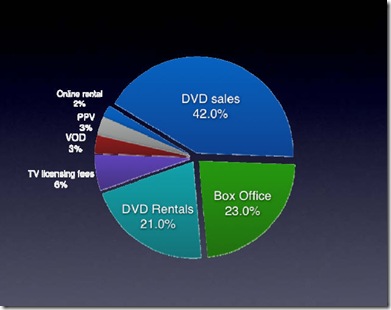
Now for anybody who works in the Canadian film industry there are a couple of things suggested here to give one pause.
First, at a time when the rest of the world's studios are reeling from the precipitous decline of DVD rentals and sales, are Canadian producers really earning almost 3X their box office take in those markets?
Second, are we to believe that almost twice as many people as went to see "Gunless" in a theatre rushed out to buy the DVD?
And does that mere 6% from TV licensing fees make sense -- especially if this pie is supposed to include that "Foreign Sales" ruler Michel Roy thinks we should maybe be using?
Here's a couple of other things to consider.
Let's assume that pie is an accurate representation of the earnings of a Canadian film.
That would mean that one of Telefilm's biggest bombs (made with A-list US and British actors by the way) Atom Egoyan's "Where The Truth Lies", which had a budget of $25 Million and only took in $3.4 Million at the Box Office (Worldwide) actually earned $14.8 Million from all sources.
Still a financial failure.
And "Passchendaele", with a budget of $20 Million and Box Office take of $4.4 Million, actually earned $19 Million.
Also still underwater.
But more than all that -- has Telefilm, which has long refused to release specific returns on specific productions -- finally given all those artists and artist guilds who have trouble getting financial reports that make sense a close estimate of what the films they worked on have actually earned?
In trying to make the case that more things than Box Office should go into measuring success, has Telefilm at last given us an insight into how much of our production entities' accounting may have been "creative"?
One thing many people may not know about the Canadian Film Industry is that Telefilm, as a Crown Corporation, does not have to respond to "access to information" requests that other Government agencies are required to provide.
Their standard response is that the earnings of private corporations (despite an average 71% contribution of public money) must remain confidential.
So there is no way I can double check that a financial statement I get from a Canadian producer is accurate. I have to take his or her word.
Even artist guilds, which have the right to audit built into their collective agreements, can only go by the statements supplied by the Producer. And they can't share that information even when their hyphenate members are telling them the numbers they're getting from one Guild doesn't match the earnings and sales territories being reported by another.
But now that we have this chart -- what happens when the numbers reported to a profit participant don't even come close to the totals it allows you to extrapolate?
Is the producer lying?
Or are his DVD sales just not at the level Telefilm assures us is an accurate measurement?
Since Telefilm did not utter a word when a Producer testified in court that he kept two sets of books, one for Telefilm showing profits and one for investors which showed losses; when Telefilm has never gone public on the details of its working relationship with the officers of Cinar, accused of bilking them for millions and this week charged by the RCMP in a $120 Million fraud -- the average guy begins to wonder a little.
Is Telefilm protecting the privacy of Canadian producers -- or their own shortcomings?

But in the end, Ms. Brabant wrapped up her speech by promising that all would soon be revealed. And this week, another veil was shed.
This was a Telefilm announced plan to canvas the nation for "initiatives to enhance visibility and expand audiences for Canadian content".
In other words, despite all the fancy talk and the fact that it's their fucking job, they haven't actually thought of anything, so -- over to you.
The plan is to have Valerie Creighton of the Canadian Media Fund pack up her traditional selection of curried soups and gluten free desserts and hop-scotch the country much in the manner she did trolling for input on the "New Media Fund", which, unfortunately, some of us remember all too well.
While many jumped at the chance to kick in some ideas with the Twitter hash tag #wantCancon dutifully compiled for those Twitterless or with an actual Life on Will Dixon's eminently fair-minded blog.
But something about all this felt funny, so I went back to the text of Ms. Brabant's speech, finding this…
"We spent most of the past year consulting with the industry, researching particular topics and formulating ideas for the next four years. What we discovered was a surprising degree of consensus about where the industry is going and what kind of support it needs to succeed."
Wait a minute! Wait a minute…!
They've already spent a year canvassing the industry for ideas? And now they're going to spend another year canvassing the industry?
Does nobody at Telefilm have any ideas of their own?
How'd they qualify for the job?
And we pay these people six figure salaries and an indexed pension to do nothing but ask us how we'd run things -- and then ignore most (if not all) of that input?
Surely that's not the way government Arts bureaucracies work!
It can't be!
No. Something about this still wasn't right.

(Y'know, these pictures stopped having much to do with the topic a while ago. I'm just finding they make the writing a little less painful)
I went back and read that Telefilm press release thinking maybe if I read between the lines a little…
"Look to Industry expertise…" Yeah, that's good. "Production, broadcast, distribution" -- whoa -- all those guys who have been lobbying for lower Cancon percentages and qualifying for grants and tax credits on films and TV shows with fewer Canadians involved in the productions?
Don't they already know that bunch don't want more Cancon and think completely aping American product (preferably with Americans) is the answer?
"…Strategy vitally grounded in the provinces and territories…" Okay, so nobody wants to rock the regional boat, so we won't be changing anything there. But we'll rack up a lot of Aeroplan miles and stock up on that great Motel 6 shampoo you can't get in Ottawa…
"Engage Telefilm staff…" They haven't done that yet? "…elected officials, community leaders and influencers…" Boy, I can't wait to hear what Rob Ford has to say to them.
"…offer alternatives to Hollywood…" What? Like Bowling?
Have you noticed something missing here -- besides a complete lack of direction and leadership?
The audience.
Y'know, the guys that have already voted to stay away from our movies? How come nobody wants to ask them why they don't go to see Canadian films? Wouldn't you think they'd be the first people you talked with?
And then -- I remembered another veil recently tossed aside…
One Telefilm didn't mention in their new press release…
The call for comments on updating Canada's co-production treaties.
Under the proposed amendments are the following:
1. Allow producers to qualify as an official co-production by only investing 10% of the budget.
If you enjoyed all the Canadian content of "The Tudors", you'll love shows with even less of it.
2. Allow a work to be produced in the territory of a non-party for storyline and/or creative reasons.
In other words, it doesn't have to be shot or even posted here. So much for those great crews we've built.
3. The proposal identifies four key positions in a fiction production: director, screenwriter, lead actor, second lead actor. Only ONE of these four has to be filled by a Canadian.
And the penny dropped.
It doesn't matter what any of us say.
They've already decided what they're going to do.
Y'know, you gotta hand it to Michel Roy. He may not have overseen any movies anybody wanted to see, but he finally found a way to get rid of those fucking Canadian actors -- and maybe the crappy screenwriters and directors too.
I'm sorry this has been so long-winded. But it had to be. And it should be obvious to anybody paying attention that we're being played here.
Played by people who couldn't give a damn about you, your work or the audience.
Telefilm has provided a good living for those within its offices while inexorably working to diminish those they supervise, the ones who might truly contribute to Canadian culture and the nation's economy and the way the rest of the world views us if they were ever given the chance.
You might want to attend one of these industry engagement sessions to offer your ideas for exciting people about Canadian film. But they're not listening to you.
They're listening to those who have failed before and are covering their own asses by blaming you (be you artist or audience) and working even harder to eliminate you from their equations and their methods of measurement.
If you make something good, people will pay to see it. If you don't or can't -- then cover your ass and make it look like somebody else is to blame.



